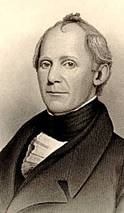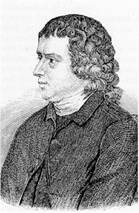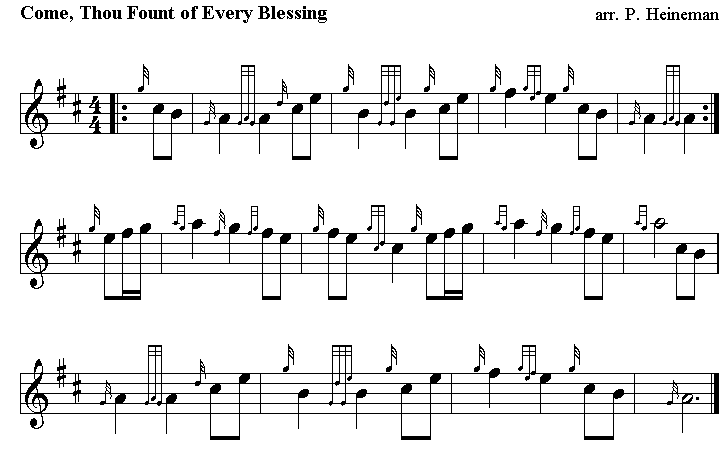 |
|||||||

Best viewed in
|
Come Thou Fount of Every Blessing
Robinson is best known today for his authorship of Come Thou Fount of Every Blessing, a hymn which has remained popular in Protestant churches. He also wrote the lesser known Mighty God, While Angels Bless Thee in 1774. "When He was 17 he and some friends attended a meeting where George Whitefield was preaching. Robinson and his friends went for the purpose of "scoffing at the poor deluded Methodists." However, Whitefield's strong evangelistic preaching so impressed him that he was converted to Christ. Several years later he felt the call to preach and entered the ministry of the Methodist church. Subsequently, he left the Methodist church when he moved to Cambridge and became a Baptist pastor. He became known as an able theologian through his writing of many theological works as well as several hymns." - 101 Hymns Stories by Kenneth Osbeck pg. 52. Robinson penned the words to Come Thou Fount of Every Blessing at age 22 in the year 1757. As the story goes, turning to the young Robert Robinson, the bleary-eyed gipsy fortune-teller pointed a quivering finger and said, “And you, young man, you will live to see your children and your grandchildren.” “If I’m going to live to see my children and grandchildren,” he thought, “I’ll have to change my way of living.” That very night, half in fun and half seriously, he took his gang to an open air revival service nearby where the famous evangelist, George Whitfield, was preaching. “We’ll go down and laugh at the poor deluded Methodist,” he explained. Two years and seven months after hearing that sermon, twenty-year-old Robert Robinson made his peace with God, and “found full and free forgiveness through the precious blood of Jesus Christ.” Joining the Methodists, and feeling the call to preach, the self-taught Robinson was appointed by John Wesley to the Calvinist Methodist Chapel, Norfolk, England. And there, for the celebration of Pentecost (Whitsunday), in 1858, three years after his marvelous conversion, he penned his spiritual autobiography in the words of this hymn. He was accused of converting to Unitarianism later in life, partly because of his friendship with Joseph Priestly. He, however, seemed to rebuff the notion that he doubted the full divinity of Jesus Christ, a doctrine held by the Unitarian Church. A story, possibly apocryphal, is sometimes told of Robinson that one day in a stagecoach a lady asked him what he thought of the hymn "Come Thou Fount of Every Blessing." He responded, "Madam, I am the poor unhappy man who wrote that hymn many years ago, and I would give a thousand worlds, if I had them, to enjoy the feelings I had then." After his dismissal from
Dob End Lane Chapel in Failsworth, he moved to Barrack
Hill Farm in Bredbury in the 1770s. Robinson died on
June 9, 1790. He was buried in a field near his house,
where the place was enclosed by a wall. The enclosure
was a square red-brick structure below School Brow, out
of which elder bushes grew.
It was reputed that he was
laid in a coffin with a glass panel over his face. James
Cocks, in the Memorials of Hatherlow, gives alternative
reasons for his mode of disposal. One is that he had a
horror of premature burial, and his relatives were
instructed to visit his grave periodically to check that
he was still dead. An alternative explanation is that he
feared the attention of the "resurrection men". A
further account is that he had for many years protested
against the indecent manner in which funerals were
commonly conducted, and so was prompted to prepare a
private cemetery on his own land.
However, it appears that the disposal was without ceremony, at break of day, eight days after his death, which gives some credence to another explanation that, because of his disputatious life, his body was not acceptable to the controllers of consecrated ground. At one time anyone could see the coffin, and large numbers came out of morbid curiosity, especially on Sundays, so that eventually because of the scandal the place was enclosed by a wall. Asahel Nettleton (April 21, 1783 – May 16, 1844) was an American theologian and pastor from Connecticut who was highly influential during the Second Great Awakening. The number of people converted to Christianity as a result of his ministry is estimated at 30,000. He attended Yale College from 1805 until his graduation in 1809 and was ordained to the ministry in 1811. He is most notably known for his participation in the New Lebanon Conference in 1827 during which he opposed the teachings of Charles Finney and Lyman Beecher. Nettleton's theology was distinctly Reformed. He believed that salvation was a work of God alone and therefore rejected Finney's practice of giving altar calls during church services and revival meetings. The introduction of the altar call, Nettleton believed, exemplified a denial of the doctrines of original sin and total depravity.
Asahel was born 1783 into a
farming family in Connecticut. During his early years,
he occasionally experienced religious impressions. "One
evening while standing alone in a field, he watched the
sun go down. The approaching night reminded him that his
own life would some day fade into the darkness of the
world beyond. He suddenly realized that he, like all
other people, would die." These impressions were only
temporary.
In the autumn of 1800 Nettleton came under powerful conviction of sin. This conviction deepened as he began to read the writings and sermons of Jonathan Edwards, but yet he remained unconverted. It was in 1801 that a revival came to North Killingworth, and by December of that year, 32 new converts were added to the Church; by March 1802 "the congregation had been swelled by ninety-one professions." Among them was Nettleton, who, becoming "exceedingly interested" in missions societies soon had "a strong desire to become a missionary to the heathen."
Lyrics by Robert Robinson
|
||||||


